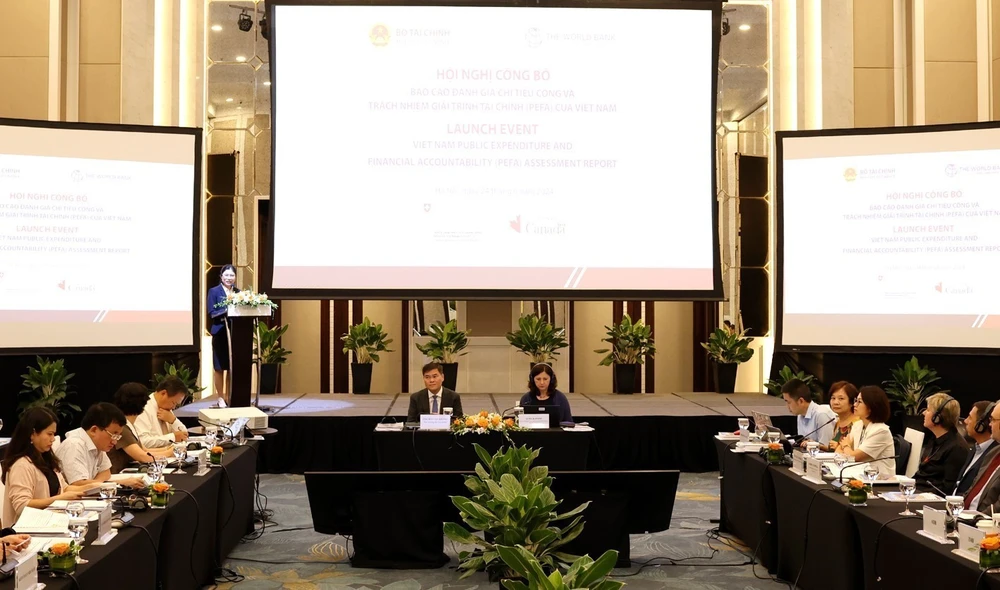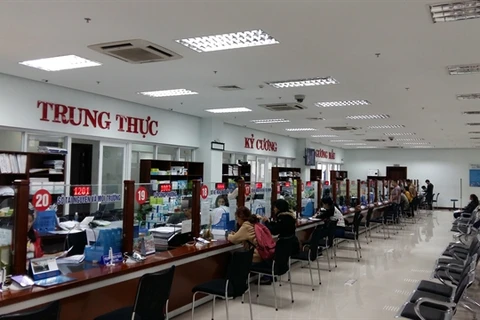
Hanoi (VNA) - Vietnam has made a lot of efforts in public financial management reform over the past 10 years and enjoyed good and relatively comprehensive progress, Deputy Finance Minister Bui Van Khang affirmed at the launch of the Public Expenditure and Financial Accountability (PEFA) report on June 24.
The PEFA programme provides a framework for assessing and reporting on the strengths and weaknesses of public financial management (PFM) using quantitative indicators to measure performance. It identifies 94 characteristics (dimensions) across 31 key components of public financial management (indicators) in seven broad areas of activity (pillars).
This is the second time the Ministry of Finance has presided over and coordinated with ministries, agencies and some localities to compile this report, with technical and financial support from the PEFA Secretariat, the Swiss and Canadian Governments and the World Bank, within the framework of the Vietnam Public Financial Management Analytical and Advisory Assistance (AAA) Programme.
This report was conducted in February 2021, and completed and reported to the Vietnamese Prime Minister in January 2024, based on the PEFA 2016 Framework.
Among the 31 indicators, Vietnam scores four As, eight B and B , eight C , and 11 D and D . Compared to other countries in the region participating in the assessment in accordance with the PEFA 2016 Framework, Vietnam gains a high number of A and B , for 11 out of the 31 indicators, following Mongolia, Indonesia, and the Philippines, and ahead of Myanmar, Cambodia, Timor-Leste, and Laos.
Alma Kanani, Practice Manager in the East Asia and Pacific Region of the World Bank, said that the report shows that significant progress has been made in PFM institutions and systems that help the Vietnamese Government achieve sound fiscal discipline and its budget implementation be strictly controlled with most expenditures committed and verified before payment. In addition, the internal control system on salaries and non-salary expenditures is also very strong, helping Vietnam reduce outstanding spending debt and carefully manage public debt with a very low debt-to-GDP ratio.
However, the report also points out several weaknesses in the country’s current PFM sector. For example, revenues and expenditures outside the central budget remain high, and fiscal risk monitoring in the public sector is still weak.
Deputy Minister Khang said that the ministry will continue researching and proposing solutions to these weaknesses to better the efficiency of management and use of resources, ensure national financial security and safety, contribute to macroeconomic stability, raise the national credit rating, further improve the production, business and investment environment, and boost sustainable growth in Vietnam.
Vietnam conducted its first national PEFA assessment in 2011 and announced the report in July 2013. Basing on the recommendations in the first report, over the past decade, Vietnam's public financial management reform has achieved many important results, especially in institutional reform with the promulgation of PFM-related documents such as the 2015 State Budget Law, the Law on Accounting, the Law on State Audit, the Law on Bidding, the Law on Public Debt Management, the Law on Management and Use of State Capital Invested in Enterprises, and the Law on Management and Use of Public Assets./.






















